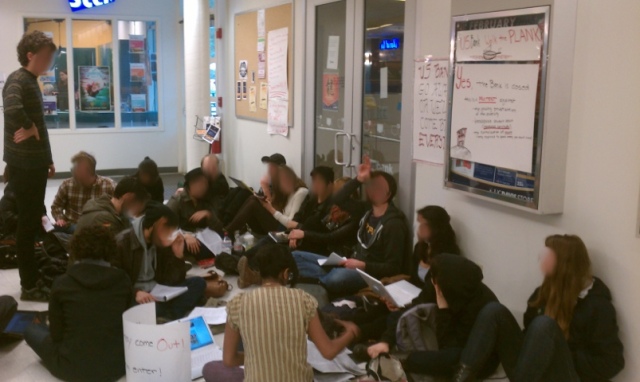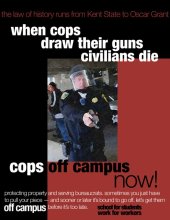The Neoliberal University

Things seem complicated, but they’re not. Yes, the UC budget is complex and the State of California is withholding funding due to its own, apparently unresolvable budget crisis, but these facts only obfuscate and particularize a near-universal movement towards the privatization of publicly owned and operated institutions: universities, libraries, public utilities, etc.
We call this movement neoliberalism, but it’s not all that new. Capitalism has a life-cycle, driven by its internal laws. Neoliberalism is simply the latest phase of decline. There have been others. We hope this will be the last. When capitalism reaches a limit to growth in the productive sector (this means industry), it compensates with speculative investments (loans and other finance tools).
These investments are bets. A bank wagers that the money it loans will be used profitably enough for the borrower to repay it with interest. If the borrower can’t pay, the bank loses its bet. This is the risk the bank takes—like a professional gambler, it knows the odds, and will cheat whenever it can.
When there is a general decline in profitability, though, it gets harder for banks to cover their bets. Fewer jobs exist. Borrowers can’t repay loans if they can’t work and earn money. Banks never admit they made a bad bet, though. For individuals, unpayable debt becomes a Moral Obligation; for banks, unpayable debt means “too big to fail.” Banks will seize homes and property, garnish wages, and use intimidation to squeeze a few more pennies from debtors. To place this in context, there were 1.5 million homeless people in the US at the end of 2010. That same year, banks seized more than a million homes. This is the story of the last three years (since the housing market crash in late 2008). When so many loans simply can’t be repaid, the credit bubbles inevitably burst. The resultant boom-and-bust cycle is the story of the last 40 years (Japan’s Lost Decade, the fall of the “Asian Tigers,” the dot-com bubble, the housing bubble).
In the era of financial capital, profit is not to be found in production. Investors have to look for ways to extend credit and enforce its repayment. The enforcement part must be emphasized. Neoliberalism never walks alone: it rolls up with union-busting, budget-cutting thugs—Thatcher, Pinochet, Yudof—and a militarized police apparatus that allows the banks to loot communities, universities, and even entire countries (Greece, anyone?).
State disinvestment in public universities must be understood in this context of declining profitability and financialization. Unlike Keynesians and other professional optimists, we don’t think the money is coming back. That’s why we propose the more radical solution of making the university free, student-run, and universal, i.e. open to anyone. This will frighten those worried about “outside elements.” We say there are no outsiders.
Banks
When we say students have been sold out to the banks, we are talking about two things.
(1) Student loans
Student debt has now surpassed consumer debt in the United States. This is a result of two related facts. First, tuition costs have skyrocketed, forcing us to take out loans. Don’t tell us to get a job; we work more than our parents’ generation did when they were in college. Second, alternatives to college, like getting a decent job with a high school diploma or vocational degree, have evaporated. Those jobs are gone. What’s left are the military, prison, or the shitty jobs we work between classes.
Decades ago, when quaint-sounding things like democracy were still taken seriously by the political elite, it was thought that having an educated citizenry was essential for a healthy civic life and for economic development. Those days are over. Now the prevailing view is that public goods like the university, in which the ghostly residue of the commons persists, must be sold to private corporations. In fact, the only real profit to be made these days consists in aggressive, Bain Capital-style takeovers and/or pillaging the public sector. The Regents been selling us out for years; now they’re trying to finish the job. Operational Excellence!
(2) US Bank at UC Davis
“The university is selling students to the bank because it’s the only way to generate more income from students who don’t otherwise have it.”
The administration and its ASUCD surrogates, always on the lookout for a revenue stream, have allowed US Bank to set up a branch in the Memorial Union. Instead of study space or a tutoring center, we now have a bank in one of the most high-traffic areas on campus. In exchange for royalties (that will be spent on unspecified “services and programs”) on new student banking accounts, UCD signed a ten-year agreement with US Bank, which now has access to university premises to set up branches and ATMs, and marketing rights at university events, including student group or organization meetings. Students were also forced to obtain new ID cards doubling as bank cards.
US Bank is willing to pay royalties to the university for access because they know that students are a vulnerable and therefore profitable customer pool. We live from paycheck to paycheck and are likely to incur overdraft fees or to take out loans to bridge the gap between what we’re paid and what we must pay. At a historical moment in which banks have reached new heights in predatory lending, fraud, and reckless, speculative investment, the administration invites US Bank, the eight-largest holder of student loans, onto our campus. Administrators like to play the part of the concerned parent—”yes, we pepper-sprayed you, but it was for your health and safety”—but they are not concerned in the least about forcing us into debt slavery with the two-pronged attack of increasing tuition and selling us to the bank.
We’re fighting back. We’ve blockaded the bank daily for over a month, forcing it to close early or preventing it from opening. We plan to continue until US Bank packs up and leaves.
[Update (3/16/2012): The blockade has succeeded! US Bank has fled with its tail between its legs!]
Professors
When we say “behind every fee increase, a line of riot cops,” it’s not just rhetoric. This shit is real. Every tuition hike and budget cut in the service of privatization is met with resistance by those who refuse to allow further incursions into the commons. And every act of resistance, however peaceful or non-violent, is met with violence: pepper spray, smashed-off fingers, beatings, near shootings, and the more subtle violence of legal proceedings and student judicial sanctions (suspension, expulsion, loss of scholarship funding).
The chancellors, hired by the Regents to continue the neoliberal transformation of our public universities, have an armed police force at their beck and call. We’ve seen them use it many times to crush opposition to the neoliberal agenda. Until this elementary situation changes, students will continue to be victimized by administrative violence. This is why we call for a university without cops or bosses.
The measures recently brought to the UCD Faculty Senate were never going to address this fundamental problem. In fact, they have only served to highlight divisions among the faculty, which Katehi will continue to exploit to her advantange.
A brief summary of the results of these three measures:
(1) Motion to declare no confidence in Chancellor Katehi: FAILED (312-697).
(2) 5-point motion of confidence in the chancellor: PASSED (586-408).
(3) Motion condemning violent police response to non-violent protesters: PASSED (635-343).
As Michael Meranze has noted, measure 2 in particular seems “to be an effort to appear to care about the violence to students without thinking that it matters all that much.”
These results are not surprising. Many professors, believing themselves to be the beneficiaries of privatization (in the form of grants, donations, endowed positions, etc.), support Katehi’s agenda. Now we know that at least 343 of them support enforcing privatization by violent means. This is useful knowledge.
We also know that “only 37% of UC Davis faculty vote on measures regarding campus events that received worldwide attention.” And professors complain about student apathy.
Those professors who brought forward the motions of no confidence and against police violence should be applauded. It’s risky to speak out when promotion and tenure depend on toeing the line. It’s encouraging to note that 312 professors support their students.
But these motions highlight the limits of institutional struggle (petitions, motions, declarations), where the administrators will always have the upper hand. They write the rules, and circumvent them when necessary. For years, faculty have fought a losing battle to defend shared governance, tenure-line positions, and academic freedom from a rapacious administrative logic. It’s time to abandon institutional forms of defence and turn the tables on the admins. Solidarity means attack.
We urge professors to engage in direct action.
If the professors demanding Katehi’s resignation and the 312 who voted for the no-confidence measure had blockaded the administration building instead, Katehi would be gone. The same is true of Birgeneau at UC Berkeley. Instead, both Chancellors now understand that they are immune to the media outcry surrounding police brutality. The Faculty Senate has empowered the administration to hurt students.
Only direct action will reverse this situation. It’s long past time for professors to leave the comfort of their offices. You must take meaningful action to take back the university.
























